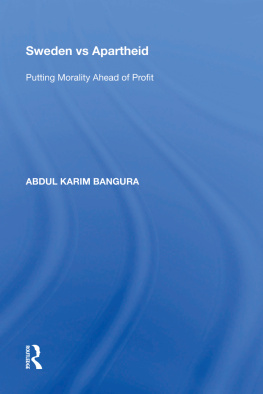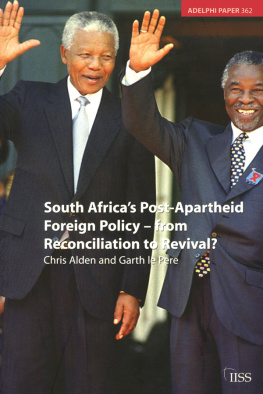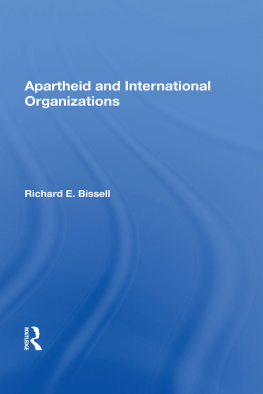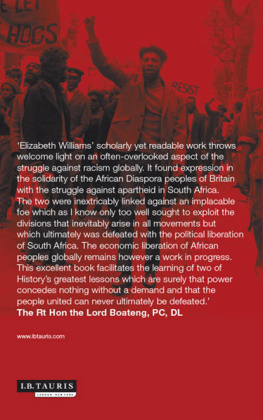Sweden vs Apartheid
Contemporary Perspectives on Developing Societies
Series Editors
JOHN MUKUM MBAKU
Weber State University, Ogden, Utah, USA
MWANGIS. KIMENYI
The University of Connecticut, USA
The Contemporary Perspectives on Developing Societies series was founded to serve as an outlet for policy relevant research. Books published in this series provide rigorous analyses of issues relevant to the peoples of the Third World and their efforts to improve their participation in the global economy.
Also in this series
Kalu, K.A. (ed.) (2004), Agenda Setting and Public Policy in Africa.
Kimenyi, M.S., Mbaku, J.M. and Mwaniki, N. (eds) (2003), Restarting and Sustaining Economic Growth and Development in Africa: The Case of Kenya.
Darkoh, M.B.K. and Rwomire, A. (eds) (2003), Human Impact on Environment and Sustainable Development in Africa.
Mainuddin, R.G. (ed.) (2002), Religion and Politics in the Developing World: Explosive Interactions.
Saitoti, G. (2002), The Challenges of Economic and Institutional Reforms in Africa.
Mbaku, J.M., Agbese, P.O. and Kimenyi, M.S. (eds) (2001), Ethnicity and Governance in the Third World.
Ngoh, V.J. (2001), Southern Cameroons, 1922-1961: A Constitutional History.
Udogu, E.I. (ed.) (2001), The Issue of Political Ethnicity in Africa.
Magnarella, P.J. (2000), Justice in Africa: Rwanda's Genocide, its Courts, and the UN Criminal Tribunal.
Mbaku, J.M. (ed.) (1999), Preparing Africa for the Twenty-First Century.
Magnarella, P.J. (ed.) (1999), Middle East and North Africa: Governance, Democratization, Human Rights.
Kimenyi, M.S., Wieland, R.C. and Von Pischke, J.D. (eds) (1998), Strategic Issues in Microfinance.
Sweden vs Apartheid
Putting Morality Ahead of Profit
ABDUL KARIM BANGURA
School of International Service
The American University, Washington DC, USA
First published 2004 by Ashgate Publishing
Reissued 2018 by Routledge
2 Park Square, Milton Park, Abingdon, Oxon OX14 4RN
711 Third Avenue, New York, NY 10017, USA
Routledge is an imprint of the Taylor & Francis Group, an informa business
Abdul Karim Bangura 2004
Abdul Karim Bangura has asserted his right under the Copyright, Designs and Patents Act, 1988, to be identified as the author of this work.
All rights reserved. No part of this book may be reprinted or reproduced or utilised in any form or by any electronic, mechanical, or other means, now known or hereafter invented, including photocopying and recording, or in any information storage or retrieval system, without permission in writing from the publishers.
A Library of Congress record exists under LC control number: 2003063995
Notice:
Product or corporate names may be trademarks or registered trademarks, and are used only for identification and explanation without intent to infringe.
Publisher's Note
The publisher has gone to great lengths to ensure the quality of this reprint but points out that some imperfections in the original copies may be apparent.
Disclaimer
The publisher has made every effort to trace copyright holders and welcomes correspondence from those they have been unable to contact.
ISBN 13: 978-0-815-39731-1 (hbk)
ISBN 13: 978-1-351-14820-7 (ebk)
Dedication
To the victims of Apartheid
To the memory of Olof Palme
To the Swedish taxpayer
I, and hopefully many readers, owe gratitude to:
Professors John Mukum Mbaku, Babalola Cole, William W. Ellis, Walter W. Hill, and Sulayman S. Nyang, for helpfully giving their time in reading the manuscript and offering constructive suggestions.
Professor Thomas Lundn, for supporting my research efforts during my studies at Stockholms Universitet in Sweden.
Shanelle Wells, for providing critical research and keyboarding assistance.
Diana Kelly, Fatmata Aminata Bangura, Isatu Ramatu Bangura and the other members of the various families to which I belong, for offering encouragement and displaying considerable forbearance.
Ali Kunda Bangura, my late father, for the courage of losing his life advocating the very issues about which I am presently concerned - freedom, justice and equality.
Fatmata Jalloh-Bangura, my mother, for providing the sense of assurance that such an endeavor could be successfully completed.
Duramany Deen-Sie Sawaneh and Abdul Rahman Kamara, for providing brotherly support during our studies at Stockholms Universitet in Sweden.
Professors, administrators and staff of American University's School of International Service, for providing stimulating academic nourishment.
American University students, for listening to and providing useful comments on the subject.
In contemporary international relations, the self-glorifying language is notoriously unflattering. What we often hear is a confusion of wealth with success, an obsession with being 'the sole superpower' and the 'profit motive,' and a plethora of bloody metaphors invoking images of Darwinian jungles and guerilla warfare. If we are to listen only to the supposedly self-glorifying rhetoric, we might well come away with the idea that international relations comprise a brutal battle for survival, devoid of rules, trust, or courtesies in which mercy and mutual consideration (much less altruism and concern for the public good) are sheer folly. Or, at best, we might come to believe that the aim of international relations is to join an exciting game, take risks and be challenged, get there ahead of the other country and, above all, 'have fun.' (It is worth mentioning that African languages do not have an exact translation for the Western notion of 'having fun,' and after adolescence an individual supposedly learns that risks and challenges can be foolish as well as invigorating, wasteful as well as productive.) Or, more cynically, international relations present themselves as a grueling necessity, without ultimate point or purpose. Strikingly lacking is a vision: the failure to see the 'global system'-except of course in flights of rhetoric about 'the magic of the capitalist world market' and 'the blessings of comparative advantage' that have very little to do with the actual on-the-job experience of most policy-makers and bureaucrats. In many such descriptions of international relations, we hear surprisingly little reference to respect for other peoples and cultures or shared prosperity. We read and hear about deadlines, organizational politics, moral mazes, 'tough' and sadistic leaders, carrot versus stick theories of motivation, international market pressures, and keeping ahead of the competition. As the larger vision gets lost from view, countries become so entrenched in their individual and increasingly isolated positions and ambitions that they lose sight of the purpose for living in an international community. It suffices to say that this is neither healthy and conducive to happiness and fulfillment for international relations, nor is it healthy and conducive to cooperation and efficiency in the world. Fortunately, there have been certain exceptions to this behavior. Indeed, Sweden's anti-Apartheid stance was one of them.
This book examines those factors that are thought to have dictated Sweden's opposition to South Africa's Apartheid system (the official policies of political, social, cultural and economic discrimination and segregation enforced against non-whites in that country) and the nature of that opposition. There are many reasons why this book is significant. First, it examines the foreign policy 'posture' of a state that was once a great power (before World War I-in the sense that Sweden emerged as a major military power during the 16th Century and the early part of the 17th Century, enabling it to obtain control over some of the important trade routes to Russia and annexing several areas in Europe). Second, it looks at Sweden's neutrality policy which embraced the idea of international solidarity with weaker states and groups. Third, it serves as a valuable resource to those who teach comparative political analysis who, for one reason or the other, have not taken advantage of the many enriching examples available from Sweden. Fourth, it provides those readers who are not familiar with Sweden a descriptive account of the society's people, culture, manners and customs through the lenses of its political and economic policies, its organizations and institutions. Finally, the book is significant simply because it examines the policy of one of the first Western states (Sweden) that adopted an active anti-Apartheid stance when such a position was quite unpopular in the West.











